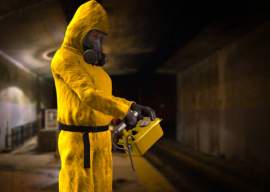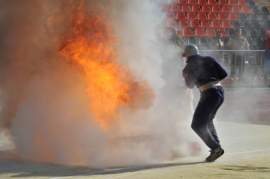
Defense Nuclear Facilities Safety Board

What is the Defense Nuclear Facilities Safety Board?
The Defense Nuclear Facilities Safety Board is an independent agency of the United States Federal Government. The Defense Nuclear Facilities Safety Board, which is stationed in Washington D.C., was formally established in 1988 to better inform and protect complexes designated for the creation of nuclear weapons. As a result of this mission, the Defense Nuclear Facilities Board will give recommendations and inspect these complexes to ensure the appropriate and safe manufacturing of nuclear arms.
Furthermore, because the Defense Nuclear Facilities Safety Board maintains its independent standing, the agency does not report to the Department of Energy. The most important power of the Defense Nuclear Facilities Board is to give recommendations concerning the construction and operation of Nuclear Arms complexes, throughout the United States of America, to the Secretary of Energy.
Defense Nuclear Facilities Safety Board Quick Facts
The following details outline the administration of the Defense Nuclear Facilities Safety Board:
The Defense Nuclear Facilities Safety Board was formed in 1988
The headquarters of the Defense Nuclear Facilities Safety Board are located in Washington, D.C.
The Defense Nuclear Facilities Safety Board is responsible for the jurisdiction over the nuclear complexes in the United States
The head of the Defense Nuclear Facilities Safety Board is Daniel Henning
What is an Independent Government Agency?
An independent agency of the United States Federal Government is a department or organization that exists outside of the federal executive departments or those headed by a Cabinet secretary. In a more specific sense, the term Independent Government Agency, is used to describe agencies that, while constitutionally operating within the executive branch, are free from presidential authority or control, as a result of the President’s limited membership within the agency.
Independent government agencies are established through separate statutes passed by the United States Congress; each respective statutory grant of authority will define the goals or mission that the agency must work towards, in addition to the substantive areas, if applicable, over which the Independent Agency may have the power of rulemaking. These agency regulations, when enforced, maintain the power of federal law.
NEXT: Bureau of International Labor Affairs




















